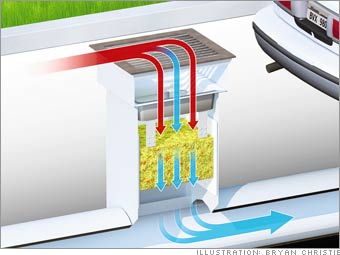AbTech Industries
abtechindustries.comThe U.S. Environmental Protection Agency has ordered that all cities with populations of more than 10,000 must stop grease- and oil-contaminated stormwater from running into lakes, rivers and other waterways by 2008. To combat such pollution, cities such as Chicago are already spending as much as $3 billion to build huge underground reservoirs and tunnels where rainwater can be treated. But in early 2007 a Scottsdale startup will begin selling a more cost-effective solution, one that easily fits into a city's existing sewer system.
AbTech Industries has spent seven years and $16 million developing its Smart Sponge filtration technology. The sponge, made from the same plastics found in automotive dashboards and sneakers, can be molded to fit any catch basin, drain or pipe. It absorbs oils, PCBs and other toxins while allowing water to pass through. The contaminants permanently bond to the sponges, which can be thrown away without harming the environment (or even recycled). Depending on the location, the sponges must be replaced every one to three years.
More than a dozen cities and Newark Liberty International Airport already line their drains with the Smart Sponge, which catches pollutants leaked from cars and planes. AbTech's latest version, due to hit markets in mid-January, comes dipped in an anti-microbial coating that destroys bacteria as well. AbTech has been testing the new sponge since 2004, lining 1,950 storm drains near the shore of Southern California, where high levels of E. coli and enterococcus bacteria sicken nearly 1.5 million swimmers each year and force cities to close beaches. On average, the Smart Sponge has killed 75 percent or more of these types of bacteria and costs about one-tenth the price of systems currently used to clean up polluted water. (Most cities either route contaminated seawater through a filtration plant or set up large lamps along the beach, which destroy bacteria by shining ultraviolet rays into the water.) --Maggie Overfelt

